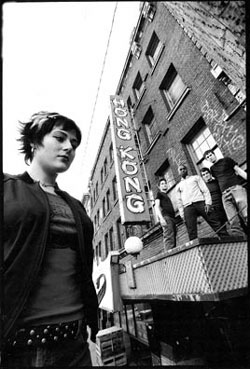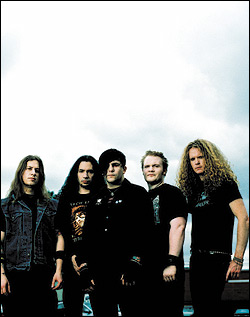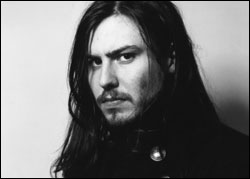Things could be worse. This could be Tallahassee, you know? Our last notable rock export to the additional contiguous 47our last “gift”could have been Creed. So even though friggin’ Vendetta Red are first in line to penetrate the egg, at least they give a shit about progressive politics and youth culture. Things could be worse if the rest of the colony catches up.
Because the expression “Seattle scene” carries such a pungent connotation that we dare not even whisper the truth: that it kind of, you know, may be back. Instead, we feign ignorance that our next-door neighbors are making incredibly innovative music and performing it down the street, because everyone elsethat great nebulous blob of enthusiasts, consumers, critics, and industry slimeballs out thereis slowly pricking up their ears again. It’s terrifying, but exhilarating, too. Maybe this time it’ll be real, something to be proud of. Maybe this time the rest of the world won’t fuck it up. Maybe nothing will happen.
Regardless, our blinders are off. We’re just now learning what New York Cityyou know, the epicenter of global culturehas already grasped: that Pretty Girls Make Graves are Seattle.
This is not to suggest that the quintet “is” Seattle in even a fraction of the magnitude that the Four Horsemen of Grunge “were” Seattle’s public face in the early ’90s, but in a lot of ways, Pretty Girls’ inconspicuous, brainy, bed-head visage is way preferable. Bassist Derek Fudescoformerly of Seattle’s last hard-rock “face,” Murder City Devilshas a label, Cold Crush, ripe with similarly artful, genre-shifting locals that are sculpting new wave, electroclash, classic rock, and punk into undefinable, pulse-quickening pop art.
Pretty Girls are an entirely appropriate epicenter in that mash-up solar system. As Fudesco puts it, “In the last year, everything I listen to is coming out, maybe in the bass lines. The Cure, Siouxsie and the Banshees. That’s the way we write songs; we’re all influenced by different things and then cramming them on top of each other.”
Plus, they sure as shit know how to write an anthem. Sophomore full-length The New Romance (to be released Sept. 9 on Matadorthat’s right, fucking Matador) is anthem-heavy, but certainly not in an “Alive” or “Jeremy” sense. Impressive, improved composition notwithstanding, Pretty Girls’ enduring appeal still stems from frontwoman Andrea Zollo. She’s diminutive, tough, sweet, fashionable, and fascinating, largely because she uses vague terminology to convey deeply personal stakes in love, growth, regret, and contempt, yet never quite declares that the songs are about her.
What do fans really know about Zollo other than that she can wear the hell out of a wristband? She galvanizes the young women who flock to the front of every Pretty Girls show but isn’t an overtly feminist or issue-oriented writer, slipping into the band’s squealing punch-counterpunch Drive Like Jehu machinations the way a male voice and perspective couldn’t.
Every PGMG release so far has at least one wildly inspirational shout-along where Zollo says just the right thing inside a precarious din. On their debut self-titled EP (Dim Mak), it was “3 Away,” the slicing sound-defining opener where Zollo’s passionate, finger-wagging “You can’t win big if you don’t bet big” and “No one ever cleans house from the sidelines” transformed what could’ve been stale gambling metaphors into vital get-your-ass-moving rallying cries.
These sentiments are expounded right away on “Speakers Push the Air,” the opening track of Pretty Girls’ first full-length, Good Health, released last year on Lookout! Attacking bad radio in a pop song is as lazy as shooting caged deer, but when Zollo follows up “Do you remember what the music meant?” with “Nothing else matters when I turn it up loud,” it’s clear she’s looking forward, informed by positive nostalgia, not bitterness.
Romance is not only a more consistent cycle, but a diversification of moods and textures that redefines the band’s sound and future for the better. Only “All Medicated Geniuses” is immediately reminiscent of their past work, a chatterbox of Jay Clark and Nathan Thelen’s Ginsu guitars backed by screamo boys-choir backups about “the kid with the golden arm.” Clark and Thelen’s vicious back-and-forth riffing no longer dominates. The suffocating “Blue Lights” is mostly bass and ambient noise as Zollo moans, “We’ll make confessions with the television on,” and the inevitable full band kick is subtle, keeping with the reflective, haunting feel, thanks in large part to drummer Nick DeWitt’s pacing.
This is hardly the cram session Fudesco referred to. It’s nuanced but just as powerful. It’s the sound of the present kicking as much ass as possible before the future busts up the party.
Additional reporting by Michaelangelo Matos.







